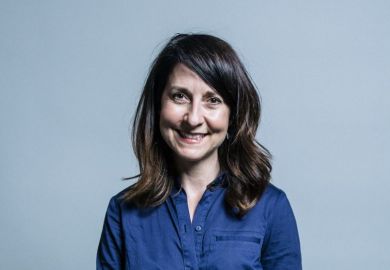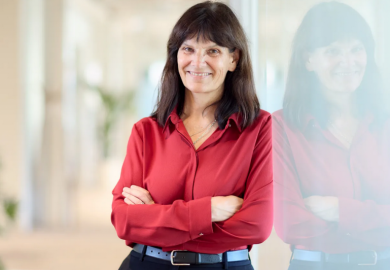The relationship between academics and Wikipedia is a complex one. At one level we love it: however much some of us may deny it, we all use it, at the very least as a route to other information, and often as a way to start to get an idea about something new. At another level we hate it, knowing how unreliable it is and knowing how much students are likely to rely on it.
So what do we do? For many academics it becomes a pragmatic exercise. We accept Wikipedia, we use Wikipedia – and we tell our students to use it with a great deal of care, particularly in terms of reliability of information. “Never cite Wikipedia” is pretty much a mantra. And yet although we thoroughly question the reliability of the information, do we question the Wikipedia project itself? Do we ask what lies behind Wikipedia – or what the project itself really means? It often seems as though Wikipedia is part of the furniture or even part of the environment: taken for granted, on its own terms. Its collaborative “openness” is seen as admirable, its neutrality accepted and respected – without either that openness or that neutrality really being critically examined or questioned.
The question of whether there is such a thing as a neutral point of view is a deep one - one that touches on the nature of truth
In Wikipedia and the Politics of Openness, Nathaniel Tkacz challenges and unpicks these assumptions. He examines the entire Wikipedia project in the way that we as academics examine a Wikipedia article: questioning at every stage, digging deeper, looking through the project to its source, so as to apprehend its nature and come to a better understanding. Given the role and prominence of Wikipedia and those behind it, and how it has come to exemplify the internet itself, this is a critically important exercise – and Wikipedia and the Politics of Openness is an important book.
At one level it is a fascinating inside look at the operations of Wikipedia – from someone who clearly knows and understands it from the inside. It looks closely at three specific “incidents”: the deletion of “Wikipedia Art” (an attempt to compose conceptual art on Wikipedia itself), the process by which the controversial issue of whether to allow images of Muhammad to appear in Wikipedia was “resolved”, and the so-called Spanish Fork through which the question of whether Wikipedia should or could allow advertising was raised. Through a detailed examination of these issues, it gives us an insight into how Wikipedia works and tells us a great deal about the people involved – right up to Jimmy Wales himself, whom Tkacz at one point describes as “one of the most celebrated ‘benevolent dictators’ in open projects”.
At the next level, Wikipedia and the Politics of Openness is a critique not just of Wikipedia but of the whole idea of openness – one of the sacred cows of the internet, something considered almost beyond criticism. At times that critique is devastating. Tkacz takes apart some of the most fundamental assumptions of openness – and challenges the idealism behind them, the seemingly sincere belief by the advocates of openness in the near-perfection of their approach to consensus and decision-making.
To exemplify this, Tkacz uses “forking”, the idea that at any point in a truly open project, people who disagree with where things are going can “fork”, creating their own alternative version of the project and taking it with them, to compete with the original. As he describes it, forking is viewed with almost religious reverence: “(the threat of) forking is [seen as] a defense against tyranny and guarantor of democracy, it produces a form of consensus, transfers power from leaders to followers, achieves practical meritocracies, de-monopolizes power, ensures maximum freedom, and brings about diversity and radical innovation”.
Tkacz writes with a commendable dryness and wit – so much so that at times it is hard to tell which side of the story he is trying to tell, but that is, I feel sure, entirely deliberate. Indeed, Wikipedia and the Politics of Openness reads as though every word has been carefully chosen – and every ambiguity intended to make the reader think. The discussion of the so-called neutral point of view (NPOV), one of the five “pillars” of Wikipedia, really hits home: it is in many ways the heart of the book and of Tkacz’s criticism of both Wikipedia and the concept of openness itself. The question of whether there is such a thing as a neutral point of view is a deep one – one that touches on the nature of truth.
As Tkacz puts it: “In fact, Wales’s take on Wikipedia and truth goes even further than [academic Joseph] Reagle’s. It is not particular battles for truth that are ‘abandoned’, but truth in general. It is this ‘philosophical side-stepping’ that paves the way for consensus-based collaboration. There is, however, a second relation to truth, what might be called the truth of the NPOV or the internal truth of the encyclopedia…while the NPOV doesn’t claim to tell the truth about a thing, there is nonetheless a truth about what is neutral.”
This may be the biggest point of all – and one with a wider application than just Wikipedia. It has implications for our whole relationship with the internet, with data, with the digital world. In some ways, Wales isn’t viewed merely as a benevolent dictator but almost as a saint – and is put on a pedestal and used in the way that saints are. His appointment, for example, to Google’s Advisory Council on the Right to be Forgotten attempts to give Google the benefit of Wikipedia’s sanctified “neutral point of view”. Google – and to a lesser extent Facebook and others – also wants to be seen as neutral in the way that Wikipedia is. That way Google can avoid awkward questions, escape scrutiny and even regulation – its search algorithms viewed as purely organic, its various functions seen as provided primarily in the public interest, serving the internet and those who use it through altruism, rather than as a business whose interests are essentially economic and self-serving.
This alleged “neutrality” is critical – and our acceptance of it without real question is something that Wikipedia and the Politics of Openness challenges. It is not an easy book to read: the language is often complex and intense. To understand all the details here, one would need to be a computer scientist, a philosopher, a political scientist, an expert on actor-network theory and more – but to grasp its themes and significance, one needs only to participate actively in the modern world. Tkacz challenges assumptions and forces you to question your own views, particularly about openness itself.
As he puts it in his conclusion: “The problem of openness isn’t that it isn’t open; it is that it conceives the world in terms of this question. My task therefore wasn’t to show that Wikipedia is actually closed, hierarchical, centralized, bureaucratic, or totalitarian, but rather to try to think politically differently.”
Tkacz does think differently – and he challenges his readers to think differently. Wikipedia and the Politics of Openness made me do that. For an academic book, that might be the highest praise of all.
Wikipedia and the Politics of Openness
By Nathaniel Tkacz
University of Chicago Press, 232pp, £52.50 and £17.50
ISBN 978022619, 2307 and 2444 (e-book)
Published 12 January 2015
The author
Nathaniel Tkacz, who since 2012 has been assistant professor in the Centre for Interdisciplinary Methodologies at Warwick University, “was born in the south of Sweden but raised in a coastal town about an hour south of Melbourne in Australia. Australians are often conceived of as relaxed, direct and a bit politically naive; yeah, I guess all those things apply to me.”
He is “currently living it up in a small enclave of Coventry called Earlsdon. Somehow I was able to convince my partner Mia that life in Coventry (after 10 years in Melbourne) was the next logical step for our family. I am now facing the real possibility of having two kids with Cov accents.”
Tkacz, who tweets at @__nate__, studied commerce and arts as an undergraduate at Monash University, and then went on to complete a doctorate in culture and communication at the University of Melbourne.
He was, he observes, “a ‘minimum input for maximum result’ kind of student - more strategic than studious. It wasn’t really until I was almost finished university that I felt really inspired to learn.
“I stumbled into university with little idea about what I wanted to do. On the advice of my sister I chose to study commerce, which wasn’t the best choice in hindsight. Initially, I would describe myself as an uninterested and generally bored student. About halfway through my degree I switched to arts and humanities, eventually majoring in media studies with a minor in philosophy. Switching to the arts was quite a turning point for me. From then on I became a ‘high achiever’.”
Did first-hand experience of the Australian academy prepare him for that of the UK? Some adjustments were necessary, he acknowledges.
On his first day on the job at Warwick, Tkacz recalls, “our centre administrator came into my office and asked if I wanted a tea. I remember being quite shocked and saying to my boss that this would never happen in Australia and that the class system was still really entrenched in the UK! I soon learned that the administrator just happened to be making tea and just happened to ask if I wanted one. I’ve had to shake some of my preconceptions about British culture since then.”
And, suggests Tkacz, “in terms of the two academies, it’s difficult for me to compare them. All of my contracts in Australia were casual (temporary) and I was balancing teaching with finishing my doctoral studies. At the time I was quite squarely situated within the humanities, whereas here in England I increasingly find myself facing the social sciences. There was a wonderful intellectual culture at the University of Melbourne and I have very fond memories of my time there. England feels slightly more reserved, or perhaps ‘polite’, which isn’t a problem but it does take some getting used to.”
“Looking at the negatives,” he adds, both the UK and Australia “suffer from the continuous creep of ‘audit’, which can eat away at your soul if you let it. The fervour around the REF in England has been truly remarkable. If I were ever going to wear one of those academic T-shirts, it would read: ‘Some of my best friends are unREFable!’”
He notes that scholars in both academies are experiencing “increased pressure to find success with the funding bodies…but because I work in a research centre I can’t complain about the requirement to submit funding proposals. I do see a lot of pressure on my colleagues in departments. If Britain and Australia are so intent on pursuing a competitive agenda in education, I’d like to see them compete with the Germans in making education free again. Now there’s a challenge!”
It has been widely observed that the demographic makeup of Wikipedia editors – overwhelmingly male, white and Western – is one of the factors behind the anomalies in the weight and nature of coverage the online encyclopedia affords to certain subjects. Moreover, Wikipedia is often described as an unwelcoming place for would-be contributors. Is Tkacz an editor himself, and does he expect that the Wikipedia environment will gradually become more inclusive?
“I have edited Wikipedia in the past, but I’ve never considered myself a regular editor. It’s difficult to speculate on whether Wikipedia will become more welcoming. I hope it does and I know there has been a lot of energy put to that end. The problem with an open community, though, is that you can’t really address some of the glaringly obvious issues with policy-like interventions because doing so will result in ‘closure’.”
He adds: “Everyone is well aware of the white male demographic of Wikipedia’s editors. This continues to be a problem within Wikipedia, as it does for the wider tech world and beyond. While this is enough to cast suspicion on celebratory accounts of collaborative, participatory and otherwise ‘open’ projects, the task of my book isn’t simply to spell out these obvious shortcomings. What I am interested in is the question of how openness, as a form of political rationality, is able to circumvent such criticism.
“I also want to move away from depicting Wikipedia’s inclusivity issues as the result of some character flaws held in common by core members of the community. Although I do consider some rather exceptional moments, large sections of the book focus on rather mundane aspects of the project: policies, procedures, bots, user-access levels and so on. I try to make the case that the exclusion is a structural necessity of the project. This in itself isn’t necessarily an issue, but problems arise when you have forms of exclusion – whether text, images or users – that aren’t recognised as such.”
During 2014’s Wikimania, the annual conference of the Wikimedia Foundation, Tkacz mentioned Wikipedia and the Politics of Openness to his Twitter followers with the words: “Here’s a book you might hate”.
“Of course I was being facetious,” he recounts. “But I’m sure many Wikipedians will take issue with it, and especially with my stance of not becoming part of the community while researching and writing the book. All of the other books that focus heavily on Wikipedia were written by people who are more or less part of the community. That kind of work can and has been valuable, but I just wasn’t satisfied with it. Distance can be equally valuable as a research strategy.”
But what Tkacz calls his “strong critique of openness”, he says, “probably won’t go down so well with people who are heavily involved in open access, open source software, open data, open government, open hardware, or other open initiatives. That could be quite a few people! However, I want to be clear that I am not against everything that happens under the banner of openness, nor am I an enemy of Wikipedia. What I am against is a political situation where everything becomes coded in the language of open and closed.”
Looking ahead to 2015, what is Tkacz optimistic about? “Wikipedia reaching its fundraising goal this year. I just donated three pounds! Everything else looks pretty grim, doesn’t it?”
Karen Shook
Register to continue
Why register?
- Registration is free and only takes a moment
- Once registered, you can read 3 articles a month
- Sign up for our newsletter
Subscribe
Or subscribe for unlimited access to:
- Unlimited access to news, views, insights & reviews
- Digital editions
- Digital access to THE’s university and college rankings analysis
Already registered or a current subscriber?





